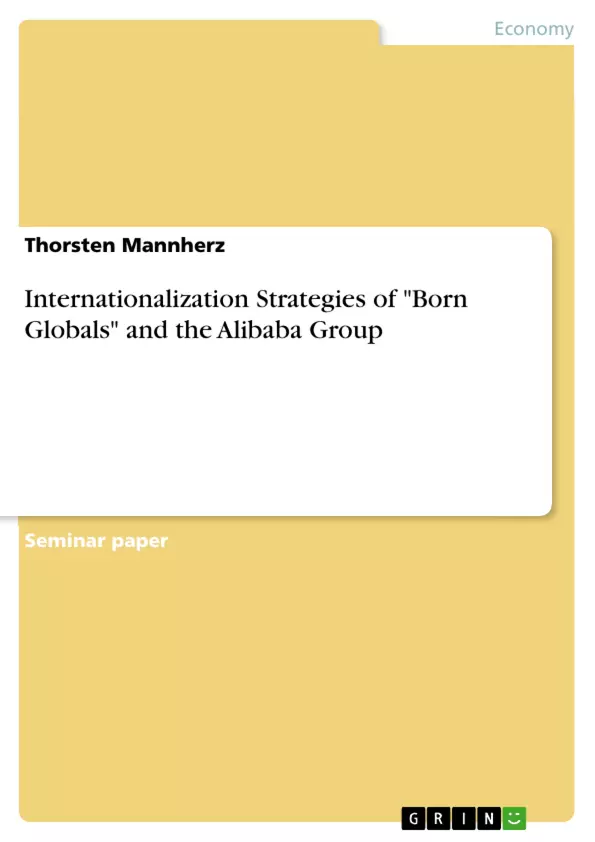Expansion into foreign markets is an issue that many companies have to address if they want to offer their products and services not only in domestic markets but also in foreign markets. In order to become successful internationally, various internationalization strategies can be chosen.
The first part of the work describes traditional internationalization strategies with the focus on the Uppsala approach as well as a relatively new concept called "Born Globals" from a theoretical standpoint. In the second part of the work, the theoretical learning about Born Globals is applied to practice at the example of the Alibaba Group. The work ends with the conclusion that the Alibaba Group shares the most common behaviors and characteristics of Born Globals.
Inhaltsverzeichnis (Table of Contents)
- Executive Summary
- Table of Contents
- List of Abbreviations
- List of Figures
- List of Tables
- 1. Introduction
- 1.1. Problem statement
- 1.2. Objectives of the Paper
- 1.3. Research Methodology
- 1.4. Structure of the Work
- 2. Theory and Concepts
- 2.1. Traditional Internationalization Strategies
- 2.1.1. Economic Approach
- 2.1.2. Behavioral Approach
- 2.1.3. Uppsala Model (International Process Approach)
- 2.2. Born Global Firms
- 2.2.1. Forces that Drive Early Internationalization of Born Globals
- 2.2.2. Characteristics of Born Globals
- 2.1. Traditional Internationalization Strategies
- 3. Practice Transfer / Case Example
- 3.1. Alibaba: Fundamental Information
- 3.1.1. Alibaba's Present
- 3.1.2. Numerical Facts
- 3.1.3. History
- 3.2. Alibaba: Characteristics and Drivers of Internationalization
- 3.2.1. Timing of Internationalization
- 3.2.2. External Drivers of Internationalization
- 3.2.3. Comparison of Alibaba with Characteristics of Born Globals
- 3.1. Alibaba: Fundamental Information
- 4. Results and Analysis
- 4.1. Traditional Internationalization Strategies versus Born Globals
- 4.2. Classification of Alibaba's internationalization strategy
- 5. Summary and Outlook
- 6. Reference list
Zielsetzung und Themenschwerpunkte (Objectives and Key Themes)
This paper examines the internationalization strategies of "Born Globals" using the Alibaba Group as a case study. The objective is to analyze how Alibaba's international expansion aligns with the theoretical framework of Born Global firms. The paper explores the forces driving early internationalization, identifies key characteristics of Born Globals, and assesses how Alibaba's internationalization strategy fits into the broader context of traditional internationalization approaches.- Internationalization strategies of "Born Globals"
- The Alibaba Group as a case study
- Comparison of Alibaba's internationalization strategy with traditional approaches
- Analysis of forces driving early internationalization
- Identification of key characteristics of Born Globals
Zusammenfassung der Kapitel (Chapter Summaries)
- Chapter 1 introduces the problem statement, objectives, research methodology, and structure of the paper. The paper focuses on the internationalization strategies of "Born Globals" and uses the Alibaba Group as a case study.
- Chapter 2 provides a theoretical framework for understanding internationalization strategies, focusing on traditional approaches and the emerging concept of "Born Globals". It discusses the Uppsala model and identifies the forces driving early internationalization of Born Globals, along with their characteristic traits.
- Chapter 3 delves into the Alibaba Group, providing fundamental information, historical background, and insights into their internationalization strategy. It examines the timing of their international expansion and analyzes the external drivers that have contributed to their success.
- Chapter 4 compares Alibaba's internationalization strategy with traditional approaches, categorizing its strategy within the Born Globals framework. It analyzes the key similarities and differences between Alibaba's approach and the theoretical model of Born Globals.
Schlüsselwörter (Keywords)
This paper focuses on the internationalization strategies of "Born Globals," exploring the case study of the Alibaba Group. Key concepts include traditional internationalization approaches, the Uppsala model, Born Global characteristics, early internationalization drivers, and internationalization strategies. The analysis centers on the Alibaba Group, examining their international expansion, key drivers, and alignment with the Born Global model.- Arbeit zitieren
- Thorsten Mannherz (Autor:in), 2018, Internationalization Strategies of "Born Globals" and the Alibaba Group, München, GRIN Verlag, https://www.grin.com/document/416396



